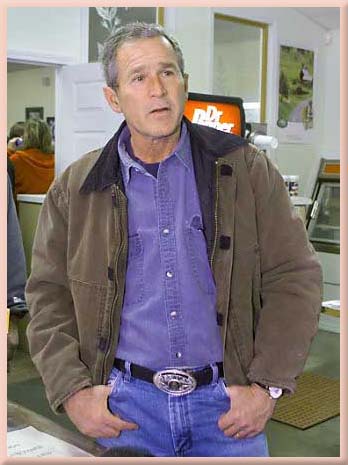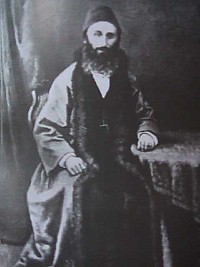Why am I even surprised? Chris Hitchens has joined the right-wing
attack on Cindy Sheehan.
I've got my differences with Ms. Sheehan, as I detailed early this morning, and they are not small, but what Hitchens has to say on the subject strikes me as nothing more than his usual junior-high level rant, for all his factual knowledge.
Let's see:

He says Ms. Sheehan lacks any particular moral authority to comment on the war in Iraq, asking "Suppose I had lost a child in this war. Would any of my critics say that this gave me any extra authority? I certainly would not ask or expect them to do so. Why, then, should anyone grant them such a privilege?" Well, the fact is that Hitchens has
not lost a child in this war, and neither he nor any of us can know what he would say if he had. Would he say the same thing he's been saying right along? Change his mind about the need for war or the justification for it? Most of all, would he remain consistent in his attitude toward the Bush administration and its pronouncements on this war? (That is, after all, what Ms. Sheehan's activities are all about.) We can't know the answers to those questions, but the point is not whether Ms. Sheehan has the
right to express her opinion. Hitchens agrees that she certainly does, this being a democracy and all. No, the point is how we
listen to what she says now that she's lost a child. If Mr. Hitchens had lost a child in this war, I might agree with what he said and I might not, but whatever his comments, they would have a lot more weight than they do now. That's why I'm more interested in what Ms. Sheehan has to say than in what Hitchens has to say at this point; not because of what they
may do - because of what they
have done.

Hitchens goes on to give us a total mischaracterization of what Cindy Sheehan is doing in Crawford: Having spent time with President Bush before, "she now thinks she is owed another session with him, presumably in order to tell him what she asserted to the Nightline team." That's nothing more nor less than a Hitchens
interpretation of what she's asking for, and it may or may not be true, but it's no more reliable than any other interpretation. The only honest thing to say about what Ms. Sheehan is really asking for is to quote her - she wants President Bush to explain what "noble cause" her son died for. Hitchens obviously wants to present her request in the most ignoble terms possible, but in doing so he's only telling us what he wants to believe, not what's actually happened.
The man criticizes Ms. Sheehan because she's dissatisfied with President Bush's "compromise" in sending his national security advisor, Stephen Hadley, to talk to her. First of all, it's laughable to praise President Bush for compromising - his entire political persona depends on his uncompromising nature. For a man like that, a "compromise" is obviously an attempt to brush off Ms. Sheehan, her concerns and her pain. Of course she's dissatisfied with that. Second of all, Hitchens characterizes Ms. Sheehan's refusal to accept this "compromise" thus: "the Sheehan demand is liable to expand the more it is met." That is, according to Hitchens, the President has actually met Ms. Sheehan's demand, so now she's making a new one? Nonsense - as noted above, the President's "compromise" is nothing of the sort, and Ms. Sheehan's demand (far from being expanded) remains exactly what it was. She does not, as Hitchens says, want the President to come crawling to her camp, abject apology in hand; she wants an explanation of what "noble cause" her son died for.

Hitchens works in a nasty crack about what he perceives as the mischaracterization of the president's vacation - in actuality, he claims, it's not the president who's lazing his time away, but the press. Anyone who read President Bush's recent claim that he has to
"get on with my life" knows how viciously nonsensical that assertion is. And in any case, whatever the press is doing in Crawford, they're not the ones people voted for to represent them faithfully and be accountable for their safety. That falls to George W. Bush. He fell down on the job and one of his employers is asking for an explanation, but he apparently thinks it's more important to ride his bicycle.
Hitchens' next claim is so tortured a bit of logic it should be broadcast on Comedy Central. He says that, because the military is under civilian control in the person of the President of the United States, the military and their families actually have less right to petition the government for redress of grievances than civilians do. I suppose you could make a case for that in the academic sense, but in real life that's exactly the sort of alienated, cold inhumanity that George W. Bush expresses every time he blinks. (I suppose, in the unlikely event that Hitchens ever reads this, he'll feel flattered by the comparison.)

Going on from there, Hitchens reminds us that presidents often, and generously, make exceptions to this supposed exemption from the right of petition in time of war. He uses the example of
Lincoln's letter to a bereaved mother - apparently our greatest president would have been perfectly within his rights to ignore this mother of young men who died because their country asked them to put themselves in harm's way. Well, maybe so, and maybe it's that very act of climbing down from the presidential heights that makes us love Lincoln so much. Certainly we can't expect any similar humility from George W. Bush. But then Hitchens asserts that if, after receiving that letter, the mother addressee had stood up and demanded something more, she would have been removed.
Very possibly. But Hitchens is overlooking one crucial fact: Lincoln never lied to that mother or to the country about why we were at war, how long or bloody it would be, or what his aims were. Bush did. As far as I'm concerned, that fact is more than enough to excuse any inconvenience that Ms. Sheehan presents to this administration, much as I loathe her pronouncements on Israel. And any comparison between Lincoln and George W. is enough to make me vomit.

Hitchens ends by expressing his unease at anyone who claims to speak for the dead, and then proceeds to do just that, saying "Casey Sheehan joined up as a responsible adult volunteer. Are we so sure that he would have wanted to see his mother acquiring 'a knack for P.R.' and announcing that he was killed in a war for a Jewish cabal?" Never mind for the moment that Cindy Sheehan, as far as I know, made no mention of a Jewish cabal; let me repeat for the third time that Cindy Sheehan is asking President Bush for an explanation not for her son, but for herself. Call it selfish if you want, but ghoulish it isn't, and Hitchens' attempt to make it so is just one more example of the right-wing attempt to smear Ms. Sheehan by attacking statements she never made.
Happily, I am in no position to ask Chris Hitchens what the deuce is going on in that dimly-lit labyrinth he calls a mind, but if anyone ever manages to dig him out, would you send him back to school for a while so he can get some clarity in his thinking and give us all a break?
Benshlomo says, If you want to kill someone, the least you can do is shoot straight.
















































